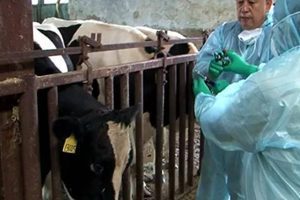
Some Cows Need To Be Quarantined In Pennsylvania. Some Pennsylvania cows have had to be quarantined after coming into contact with toxic wastewater from a hydraulic fracturing operation. The incident is just the latest to raise concerns about the safety of hydraulic gas drilling in the state. According to Reuters, the 28 cows, which were quarantined […]

Some Cows Need To Be Quarantined In Pennsylvania. Some Pennsylvania cows have had to be quarantined after coming into contact with toxic wastewater from a hydraulic fracturing operation. The incident is just the latest to raise concerns about the safety of hydraulic gas drilling in the state.
According to Reuters, the 28 cows, which were quarantined May 1, had access to a pool of toxic water for at least three days. The pool formed as a result of a leak in a wastewater holding pond on a farm in Tioga County. Eastern Resources Inc. was drilling for natural gas on the property.
None of the cows were actually seen drinking the wastewater, but cattle tracks leading to the pool were found. Grass around the pool was also dead.
There is a possibility that the cows’ meat may have become contaminated, according to the Pennsylvania Department of Environmental Protection (DEP). Tests found the water contained chemicals including chloride, magnesium, potassium, and strontium, the department said in a statement.
Eastern Resources faces a fine from the DEP, which will be assessed sometime in the next month. The DEP also said it had finished cleaning up the wastewater pool.
It’s the first time the state has quarantined cattle because of an incident involving hydraulic fracturing. However, according to Reuters, other Pennsylvania farmers have complained from time to time about animals becoming ill as a result of contact with fracturing fluid.
The 20 adult cows involved in the incident will be held from the food chain for six months, and eight calves which will be removed from the food chain for two years, Reuters said.
Hydraulic fracturing, also called fracking, involves injecting water, sand, and a cocktail of chemicals at high pressure into rock formations thousands of feet below the surface. Critics of fracking have long been concerned about the chemicals used in the process. Because the federal Energy Policy Act of 2005 exempted hydraulic fracturing from regulation under the Safe Drinking Water Act, shale gas drillers don’t have to disclose what chemicals they use. According to the Environmental Working Group, fracking has already been linked to drinking water contamination and property damage in Colorado, Ohio, Pennsylvania and Wyoming.
Pennsylvania’s Marcellus Shale region has seen a boom in fracking over the past several years. The Marcellus Shale region is a formation rich in natural gas that lies beneath parts of West Virginia, Pennsylvania, New York, Ohio and Maryland. In June, another Pennsylvania well operated by EOG Resources experienced a blowout. It spewed gas and drilling fluid into the air for 16 hours before it was capped.
Recently, Pennsylvania’s DEP began posting a list of chemicals used in hydraulic fracturing online. According to the Associated Press, many of the 80 chemicals on the Pennsylvania list include some associated with cancer, neurological problems and other health risks. Many are used consumer products, such as gasoline, salt, glues, paints and tobacco smoke. The chemicals include naphtahlene, a compound classified by U.S. Environmental Protection Agency as a possible human carcinogen. Another, xylene, has been linked to central nervous system depression.
The personal injury attorneys at Parker Waichman LLP offer free, no-obligation case evaluations. For more information, fill out our online contact form or call 1-800-YOURLAWYER (1-800-968-7529).


